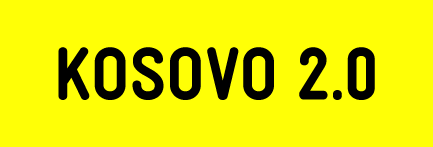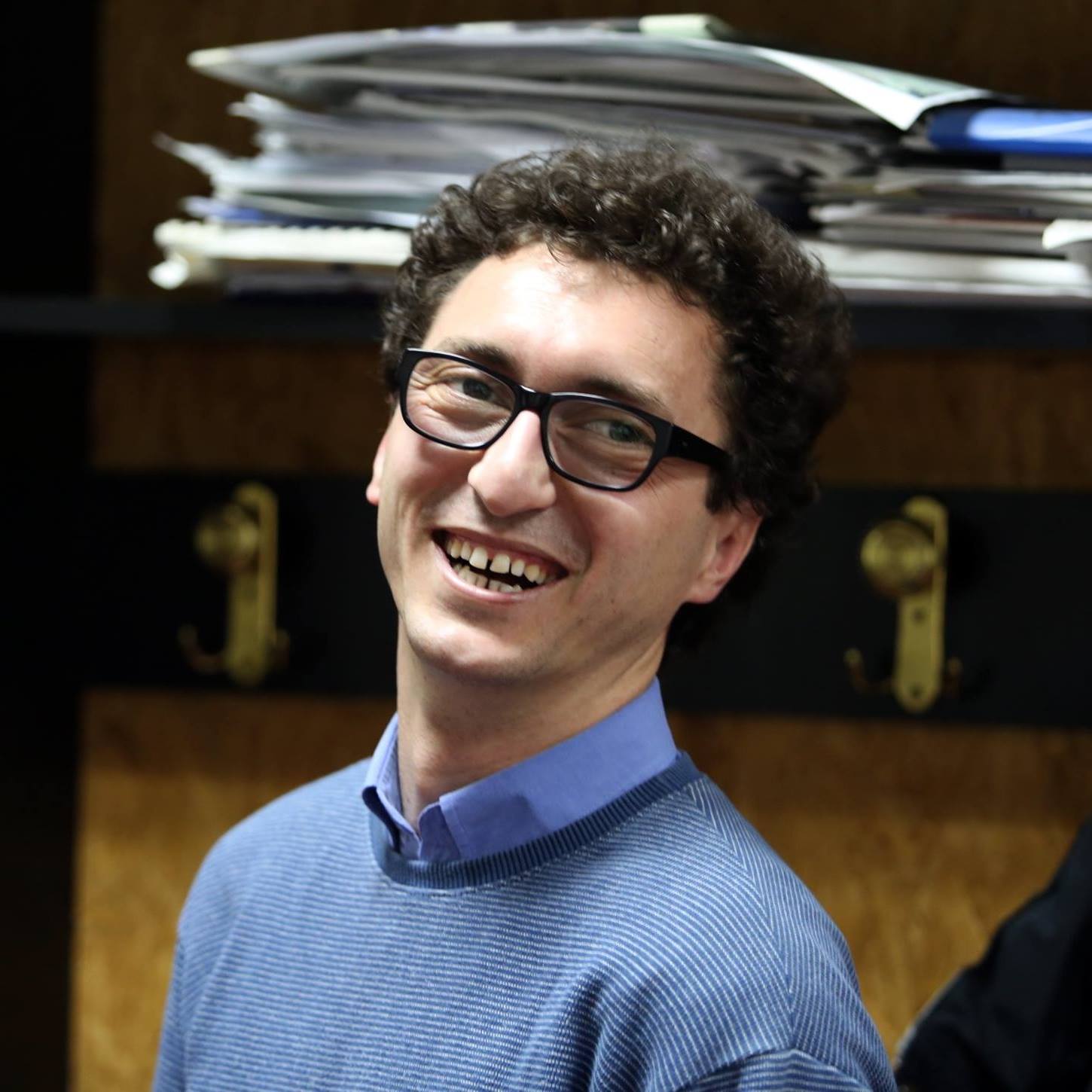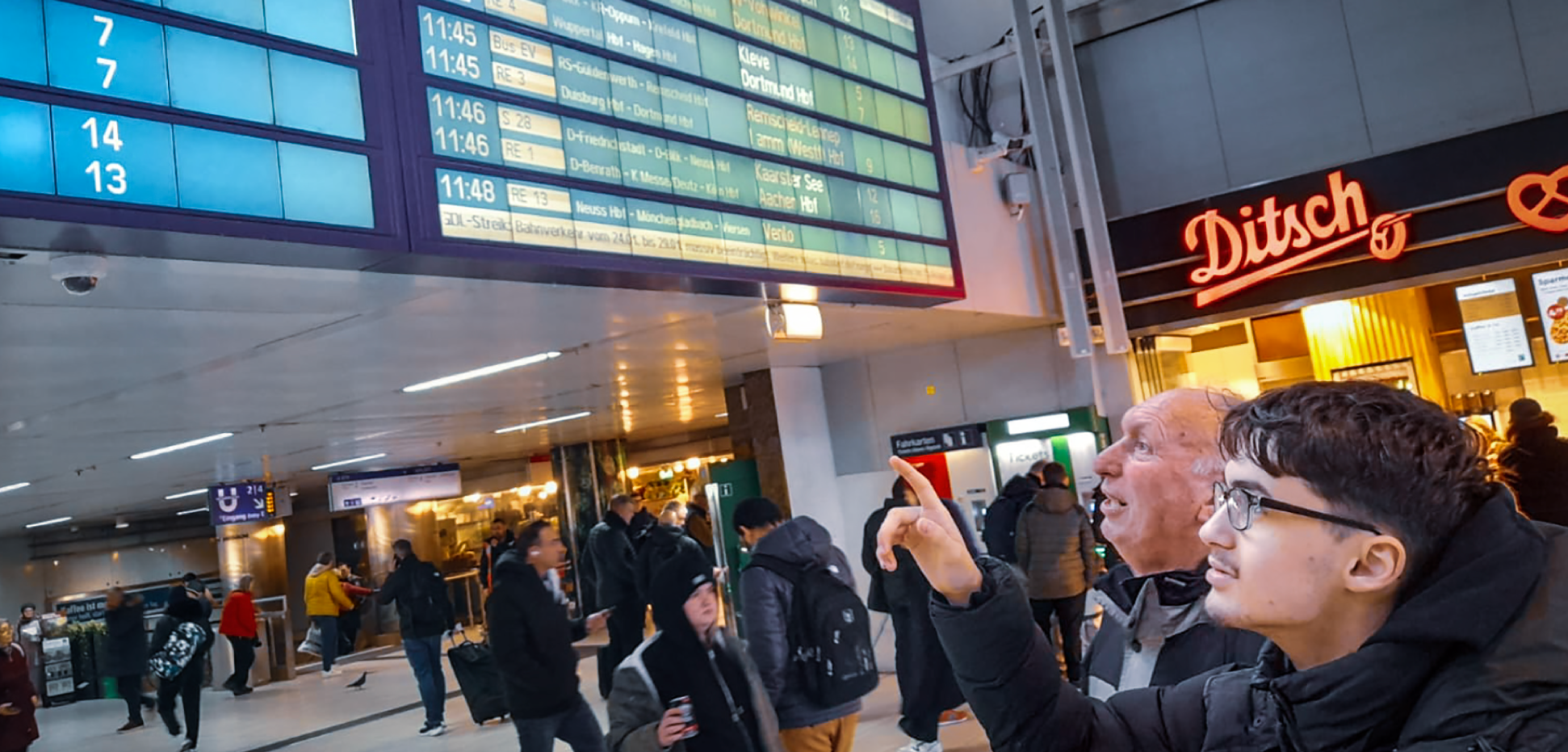
My Father Returns to Germany
My father traveled by plane for the first time in early 1985. He temporarily left his job as a teacher in the villages of Prizren and headed for Switzerland. Being the only one working in the eight-member family, including my grandfather and grandmother, he stayed in Switzerland for nine months, hoping to improve the economic situation of his family back in Ferizaj.
He worked on a farm in Switzerland. Although he had grown up and been educated in Kosovo’s newest city, my father knew very well what working in fields and lands was like. Our neighborhood was then a suburb of the city and most of the families kept cattle, working the land in their villages.
“I couldn’t stay any longer because I missed you. You weren’t even one year old when I left,” said my father, when I asked him why he returned.
“How could he possibly stay in Switzerland without me, when I used to cook him flija to eat with his colleagues on their visits to Prevalla and Brezovica,” my late mother used to tease him. My father would laugh.
After nine months in Switzerland, he returned to Kosovo to work as a teacher.
In the 1990s, as life became harder under Serbia’s violent measures, many Albanians left Kosovo for western Europe, often crossing the former Eastern bloc countries on foot — walking the snowy mountains and crossing the cold rivers. My father reached Germany illegally twice between 1992 and 1995. He slept on the tiles in the corridor of a Czech police station and then managed to sneak past the Slovak, Czech and German border guards to reach Düsseldorf by train.
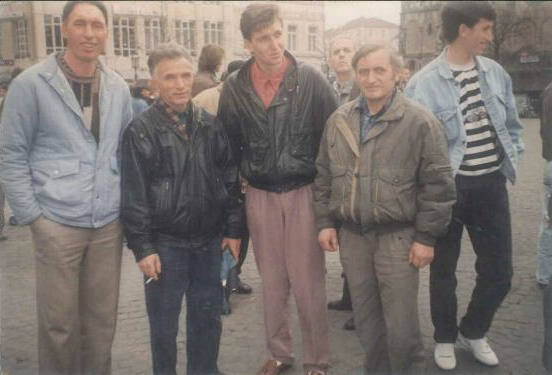
Although my father finally returned to Kosovo at the end of 1995, thousands of Kosovars stayed in Germany and eventually brought other family members there. Over the years, the Kosovar diaspora in Germany grew and today numbers about half a million. Tens of thousands went as refugees during the war in Kosovo, like my brother Faton, who left a week before the beginning of the NATO bombing on March 24, 1999. He also illegally crossed the borders of the former Eastern bloc countries to reach Germany. Others went to start a new chapter after Kosovo’s liberation, like my two sisters, Selvija and Sanija, who flew to Germany in the early 2000s, married and started families there.
Every time Faton, Sanija and Selvija came to Kosovo on vacation, they would beg my father unsuccessfully to start the lengthy process of obtaining a tourist visa so that he could visit them and Germany again.
“I visited Switzerland in 1985 with a work visa and Germany twice in the 1990s illegally,” my father would reply, avoiding the topic of visas.
But grandparents always surrender to the demands of their grandchildren. This year, my father fulfilled Faton’s son Eldi’s wish, who wanted his grandfather to be a special guest at his fifth birthday party. Eldi turned five years old in 2024. This was the year when, 24 years after the end of the war in Kosovo, the European Union finally lifted the visa requirements for Kosovars to travel to the Schengen area. The arduous process of applying for a visa, which my father had been hesitant to follow, came to an end. I did not plan to join them due to work commitments, but my father had decided for both of us.
“Maybe you’re afraid to travel alone by plane?” I teased him. “This is not my first time, but be careful because Faton said he will send you the plane tickets on Viber,” my father replied. He doesn’t use the smartphones that his siblings have sent him so they can call him for free using apps. Instead, they have to spend the extra money to call him without using the internet in order to keep in touch.
On January 24, 2024, my father and I traveled to Düsseldorf, known as the city of Ferizaj’s diaspora.
My father boarded the plane 39 years after his first trip to Germany, returning for the first time in 28 years.
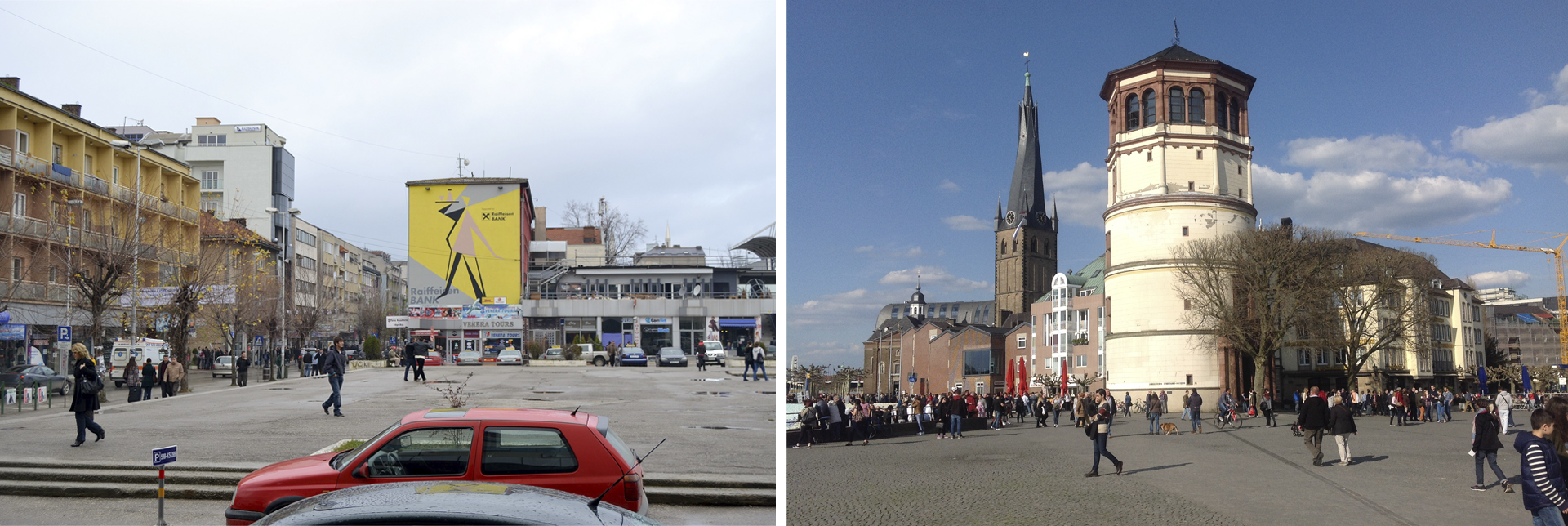
“The bakery won’t leave you alone, even on the plane”
Prishtina airport security officials and border police were courteous when dealing with older and younger passengers who were traveling for the first time. In January, a large wave of Kosovo citizens were returning their debt of visits to their family members in the diaspora. On the plane, three women in the fourth row started eating burek with meat.
“The bakery won’t leave you alone, even on the plane,” I said teasingly to my almost 71-year-old father, who works as a driver for a bakery in our Ferizaj neighborhood. “Only Zogi is missing,” he said, referring to the bakery’s owner.
In addition to a bottle of water, we also took on board a book of essays by the painter and writer from Kosovo, Rexhep Ferri, “The Cuckoo Clock.” However, journalistic curiosity does not allow you to concentrate when you are trying to read on a large transport vehicle. Sometimes I read, sometimes I look, and sometimes I wonder. Like father, like son — I’ve also been too lazy to follow the visa application process and haven’t traveled by plane since June 2014.
As my father nods off, I try to understand the decisions and challenges of his generation, most notably the challenges of the 1990s, which I remember more clearly as I was an elementary school student. They continue to accompany us like shadows, on sunny days and days with dark clouds. They won’t go away. They are a source of clashes and reconciliations on the long road to freedom.
One of Ferri’s expressions, “After each war, freedom was born dead for Albanians,” cleverly criticizes society. Ferri highlights the corruption among those he refers to as the “noble patriots” — the political class after the 1999 war, who attempted to downplay criticism of their governance by emphasizing their undeniable contributions during the war.
I got distracted from reading.
In the 1990s, the Balkan region was going through difficult times. After the removal of Kosovo’s autonomy within the Yugoslav Federation in 1989 and the various forms of Albanian resistance, the Serbian government, headed by Slobodan Milošević, intensified oppressive measures against Albanians. Meanwhile, Slovenia and Croatia declared independence from Yugoslavia as the war in Bosnia and Herzegovina was about to break out in 1992.
In Kosovo, Albanian employees were fired from their jobs and others left their workplaces, creating a parallel system of operation. My father was among the employees to leave his workplace in resistance to the growing violence.
“Look sons, the situation was already worse. So we said to ourselves: ‘Whatever others face, will come knocking on our door too,'” replied our father, when asked how he made such a decision.
My father started working in education in 1974. For several years, he worked in the mountain villages of Suhareka with his brother Rexhep, known as Rexha, after whom I am named. Rexha’s death at the age of 25 from cancer in 1980 was a severe hit for my father. He also has two brothers and two other sisters from his father’s side, but uncle Rexha was not only a brother but also a friend. In fact, my grandmother said that Rexha, more prudent, but with a strong character, was a pillar for my father. He has started talking about Rexha more in recent years.
For another 16 years, my father was a teacher at the primary school in the village of Lubizhdë, Prizren. He was used to the daily challenge of traveling from Ferizaj to Prizren and back again. But in 1992, the main challenge became securing money for the bus ticket, since teachers in the parallel education system didn’t receive salaries.
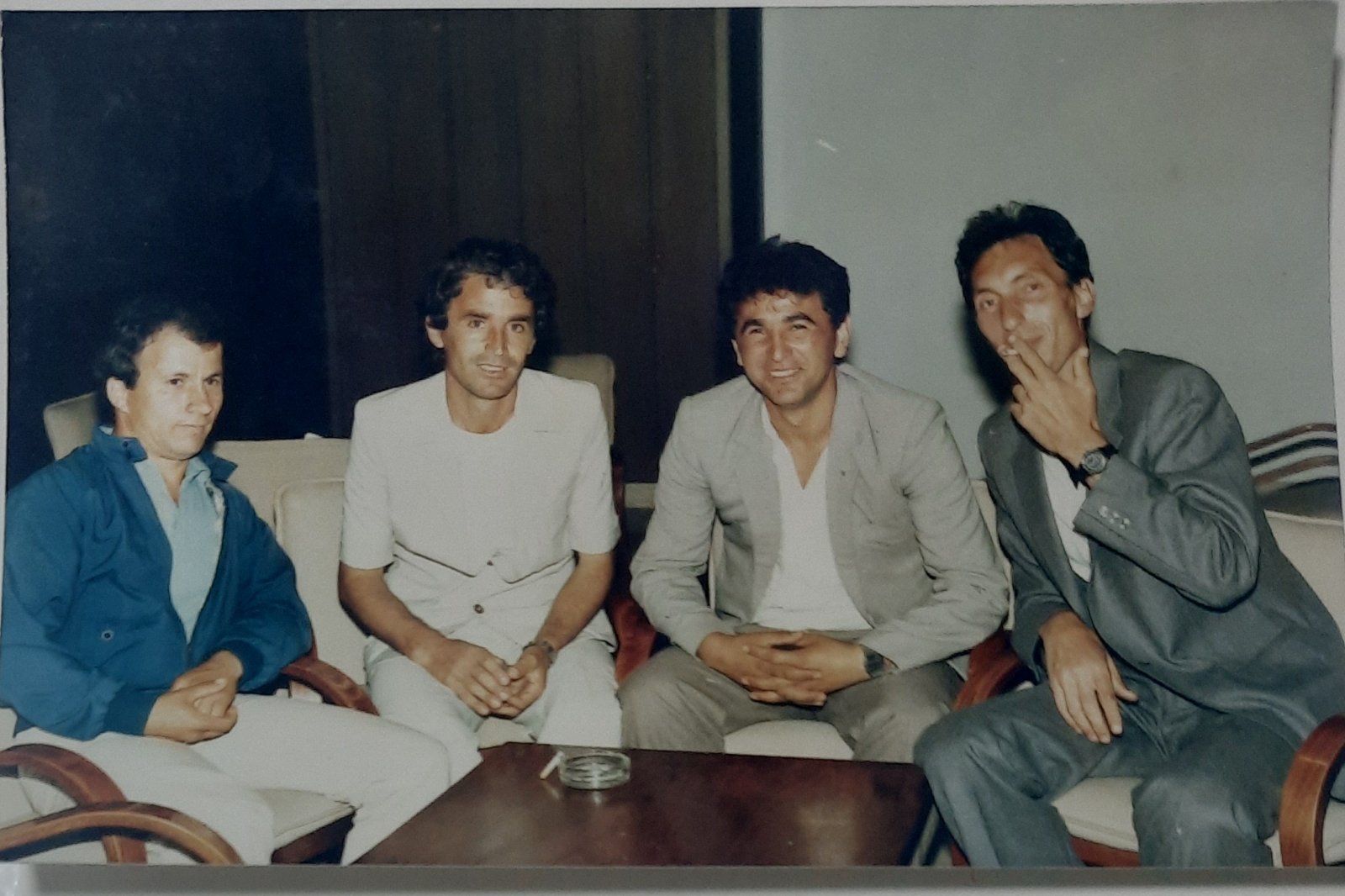
In response to this, the three percent fund was established in Kosovo. This initiative allowed all those who were employed, diaspora or anyone with financial means to contribute up to three percent of their income. The collected funds were used to finance parallel institutions such as the education and health sector.
Without their regular salaries, teachers depended on a few tens of German marks as wages. And yet, there was hope.
I return to “The Cuckoo Clock.” I continue with the chapter “How we survived,” where Ferri describes a conversation had in 1979 with a Croat in Zagreb with “thick eyebrows like Miroslav Krleža,” referring to the famous Croatian writer of the 1990s.
“You Albanians remain hopeful for a long time. You are patient and wait until everything becomes too late,” Ferri quotes, and he replies in the essay: “Whoever reads us more deeply, reads a different story.”
In this story the house was not just a home. It was a school, a university, a newsroom, a municipal directorate. The house does not only preserve the memories of family members; often, a person’s value is judged based on whether they are from a well-respected family who contributed during this time.
When the school gates were closed, the doors of our homes, which had been turned into classrooms, opened. I learned the Albanian alphabet in a house in September 1991. The boards placed on red bricks made makeshift chairs and tables, a 16-square-meter room, in a “četvorka,” the Serbian term that the adults used to refer to four-room houses, in Talinoc i Jerlive. After being expelled from the school building named after the partisan heroine Ganimete Tërbeshi, this house became a makeshift school for elementary school students from a part of the city and a neighboring village.
The owners of the house lived in western Europe, from where money came to keep education alive and also to pay for my father’s bus ticket to Prizren. As money became scarce, our grandmother’s ritual of slicing the roulade brought from Prizren into six equal parts also became less frequent. In my father’s jacket pockets, we would only find tickets issued by the blue Kosovatrans buses.
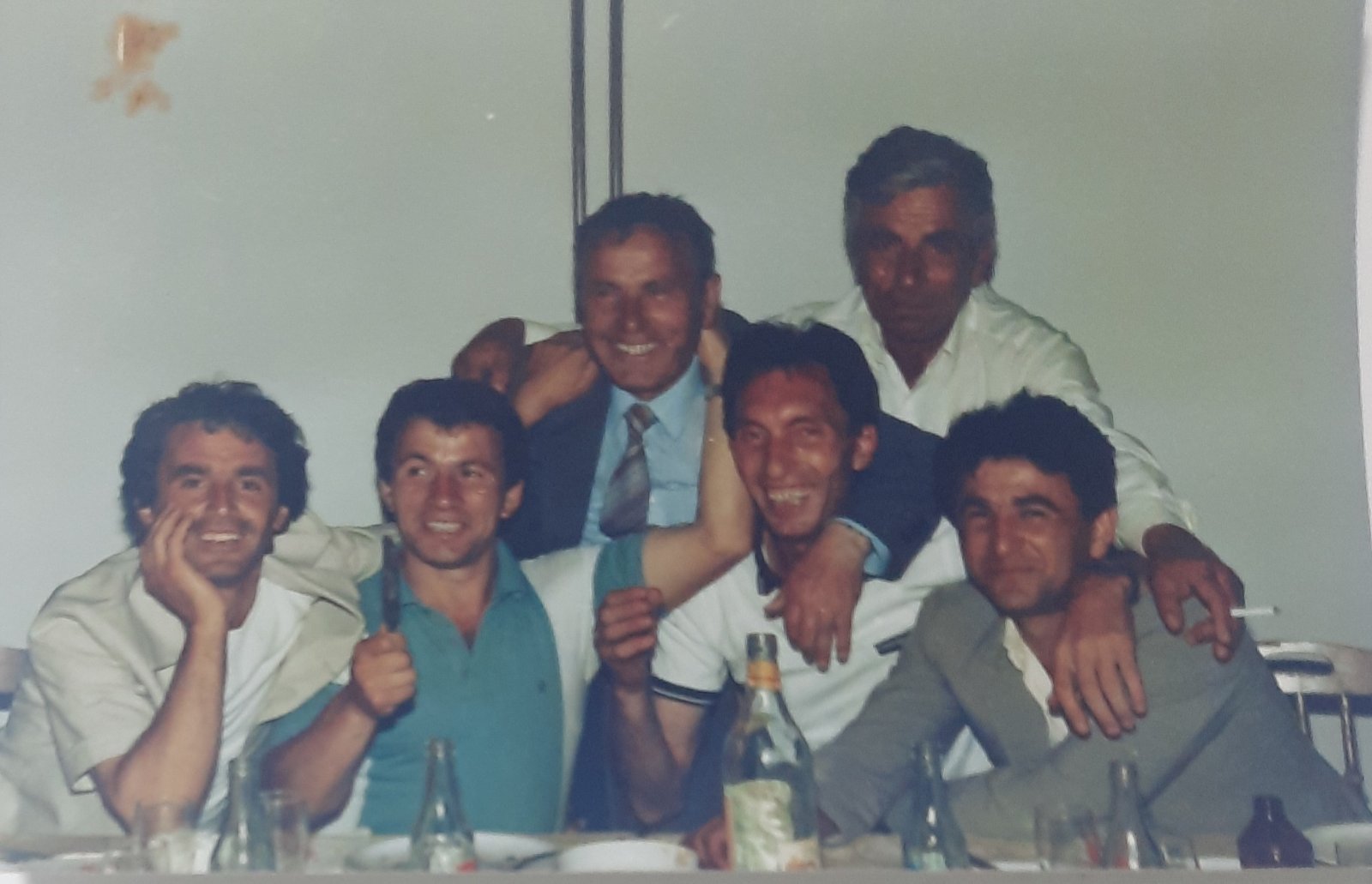
My grandfather’s pension was vital for the whole family. After working for almost two years, often without a salary, my father was forced to leave his family, students and colleagues behind. In February 1992, he set off to Germany.
He was clear about his purpose, but faced many uncertainties about the path ahead.
“Why didn’t they applaud?”
Before the plane landed, there was several minutes of turbulence that caused quite a bit of discomfort among the passengers. Some passengers instinctively began to grip the backs of the seats with their hands. Before the plane had fully touched down, the passenger next to me video-called his wife in Kosovo to share the moment of landing.
“Why didn’t they applaud?” my father asked.
In contrast to the chaotic experiences of disembarking from a plane, civil airport officials and red and green lights enforced order before passport control. Border officials asked travelers for proof of their residence address, the reason for their visit and some were also asked for proof of financial means.
“The border official is saying, ‘How is it possible to save this much with a 500 euro salary in Kosovo?'” translated an expatriate to a young man who was being heavily interrogated by the border official at Düsseldorf airport. The young man showed the official how much money he possessed. The border official also asked us for an address of residence and the reason for his visit. My father stays calm. His first journey to Germany in the early ‘90s was totally different.
In the early ‘90s, my father started his journey to Germany with my late uncle Bajram from the bus station in Ferizaj. They continued through Macedonia, Bulgaria, Romania, Ukraine, Slovakia and the Czech Republic.
“We used to cross the rivers in the winter, but also the borders. The traffickers used to bribe the Romanians and Ukrainians with a little money,” my father told my sister Sanija and niece Elsa. They had come from Kelheim in Bavaria to Düsseldorf where we were staying at my brother’s house. “There was a teacher with a wife and a child, the boy used to cry a lot,” my father added, looking at Elsa. “So much, just like in the ‘Train Kids’ by Dirk Reinhardt,” Elsa said, adding, “It is a novel that describes the stories of children who cross illegally from Mexico to the United States of America.”
My father explained that traffickers sometimes intentionally heightened the tension during the exchange of illegal immigrants, in order to increase the pressure and fear so that they could demand more money than they initially agreed upon. “They required [the equivalent of] more than 1,000 euros, saying that there are cases when friends were in debt to each other for the previous groups of illegal immigrants that they took to Germany. Uncle Bajram was caught hiding under some pine trees and they returned him to the Czech Republic. One willingly returned, since his wife and two children were arrested by the police,” said my father.
But the German police later arrested the rest of the group who had already crossed the border. “They kept us in custody one night. We slept in a row, in the corridor, our heads at the others’ legs. The next day they returned us to the Czech Republic,” he said.
The initial agreement with the traffickers was no longer valid. “A different trafficker said, ‘pay again because this time you’ll pass with another group.’ We were 16 people being transported in one van. Sometimes we stopped in one house, then in another. Sometimes we ate something, sometimes nothing at all,” said my father.
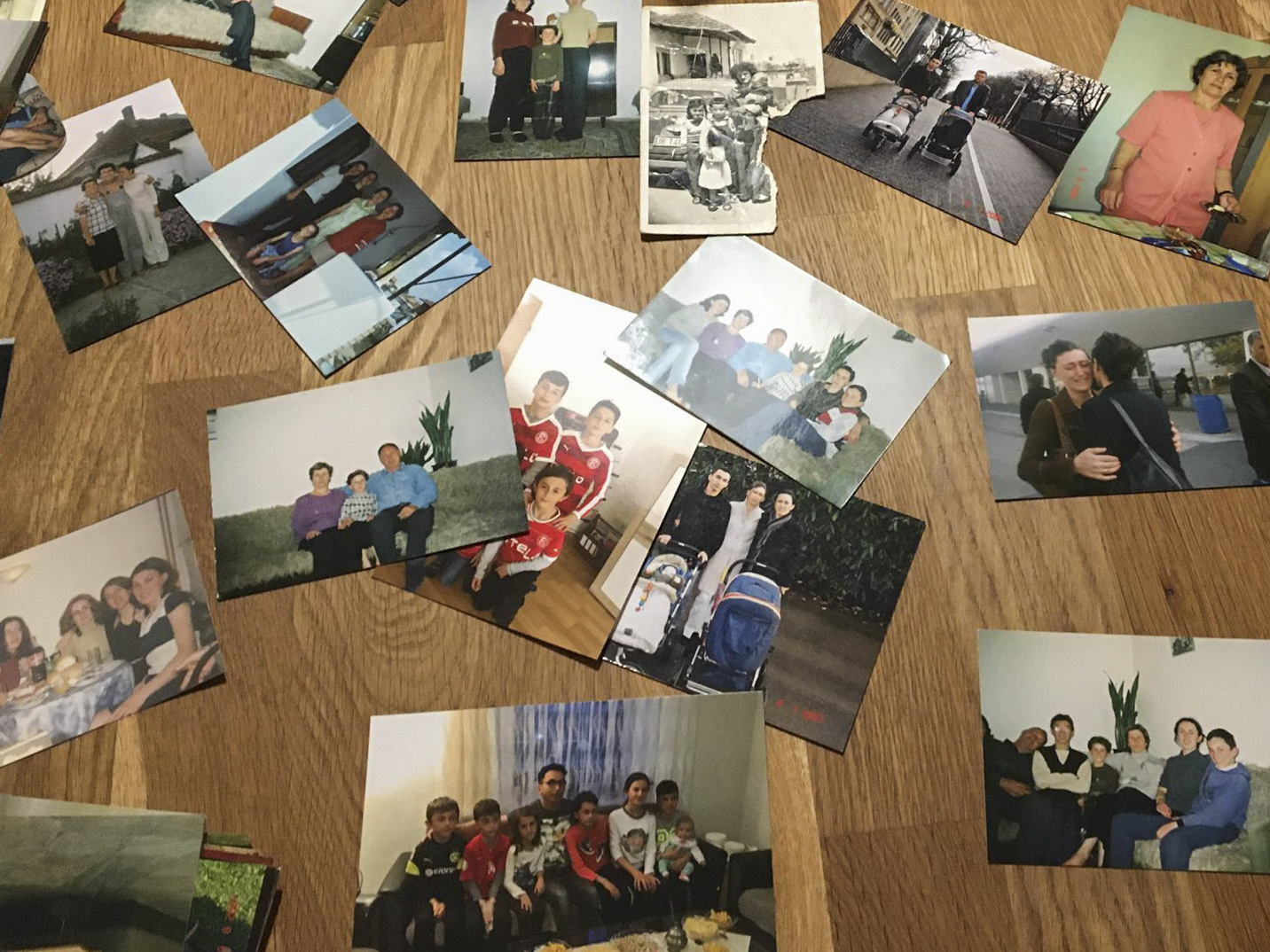
When they tried for the second time, they managed to avoid the German authorities, walking and hiding for hours in the snowy mountains. “I don’t remember the name of the place, but the trafficker booked our tickets and told us which train to board for Berlin. One of us had bought a newspaper. He spent the whole journey pretending to read it, without even understanding a word in German, acting like he’s German,” said my father while laughing. “A trafficker had a camera hanging around his neck. He was pretending to be a tourist and so as not to get arrested, he used to take pictures.”
From Berlin, they continued by train to Düsseldorf. During their year-and-a-half stay, they worked every day except Sundays. “I arrived there on Saturday, on Monday, Gani Rosha found me a job,” said my father. He was referring to Gani Reshani, an Albanian entrepreneur and political activist in Germany in the 1990s.
My father returned home for a few months in the summer of 1993, but soon after, he had to leave for Germany again.
I clearly remember the small brown suitcase that was filled with chocolates, but I can’t remember the color of the bigger suitcase with wheels. “The second time I traveled illegally, it was a little easier because I had more money to give to the traffickers,” he said.
My father also worked in construction during his second stay. Over time, he had developed the skills of a mason, as the work was better paid. However, working on the scaffolding was dangerous. He mentioned a time when he was injured at a construction site, falling from the scaffold and hitting his head on the corner of the concrete foundation. When he regained consciousness, he begged the “polier,” the German supervisor of the construction site, not to call an ambulance because the authorities would find out that he was staying there illegally.
“I cut my head,” he said, touching the place where he was injured.
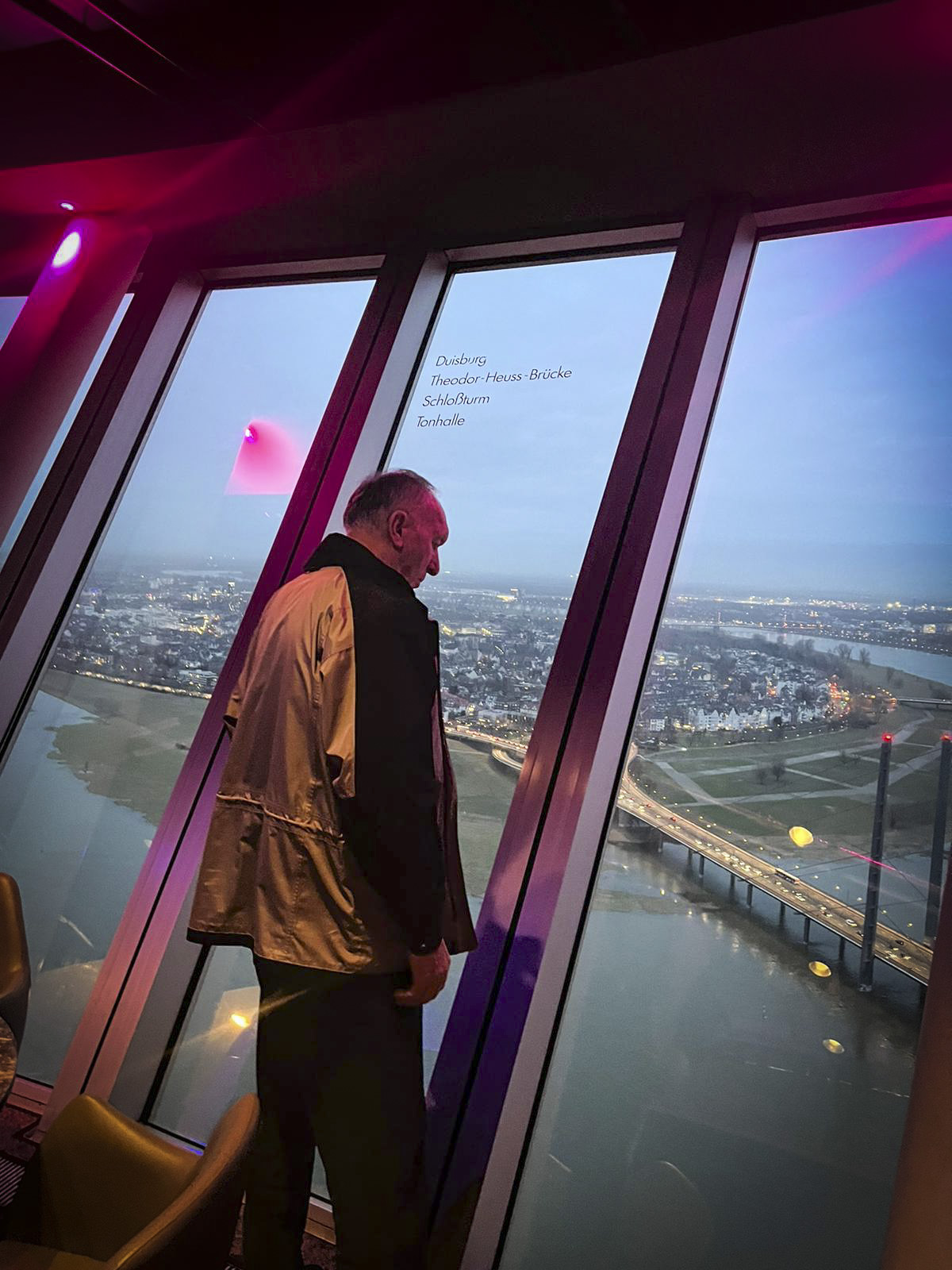
The second time, my father stayed in Germany for two years until the end of 1995. I remember visiting my uncles almost every weekend as my mother would talk to him for hours on the landline at uncle Sadri’s house.
The gravity of the conversation lightens when he reveals a secret he had kept for months from his late brother Hasan, who he was living with. He reveals that he had deceived Hasan into believing the meat he was buying was not pork. Hasan, my father’s brother, had also left illegally for Germany after being expelled from his workplace at the wood plant in Ferizaj in 1990. Uncle Hasan was later joined by his older son Muharrem, who had not responded to the Yugoslav call for military service after the outbreak of war in Bosnia and Herzegovina in 1992. As part of Serbia, Kosovars were called to announce themselves to Serbian barracks in Kosovo and join the war front in Bosnia.
In Germany, my father and uncle took turns taking care of the kitchen and laundry.
“Yes, I bought it from [the Turkish shopkeeper] Hasan,” my father always told my uncle. However, one day, my uncle debunked his claims when his nephew translated the German writing on the package for him.
Hasan, the shopkeeper, has died, but left his son a network of hostels and businesses, connected to the history of Albanian immigrants from the ‘90s. “Albanians used to leave the hostel without paying and he started not accepting anyone without first paying rent. There were people who used to insult him, but he didn’t care: ‘bezahlen, bezahlen’ [‘You must pay, so pay’]”.
The second time, my father stayed in Germany for two years until the end of 1995. I remember visiting my uncles almost every weekend as my mother would talk to him for hours on the landline at uncle Sadri’s house.
After returning, my father didn’t leave Kosovo again, nor did he return to his profession as a teacher.
After 1999, father worked for a few weeks at the Greek KFOR camp in Gërlica in Ferizaj, as the salary was good for the post-war period. When the schools reopened, he tried to return to the Gjon Serreçi primary school in Ferizaj, but gave up after a month.
“I was too detached from it and was no longer prepared to teach. If I were to continue, I would just damage the children’s learning,” said my father, who continued with various construction jobs. We also helped him with various jobs that were created in Ferizaj by thousands of foreigners, mostly Americans, who settled in the city and worked at the American camp located in the village of Sojeva.
Dad visits Germany again
On the morning of January 26, 2024, Drin, the other grandson, led us to the Hauptbahnhof. During the 25-minute walk from the apartment on Sternstraße, Drin asked his grandfather: “Do you remember anything? Here is the Chinese quarter,” said Drin.
“Your grandfather stayed here illegally. Six days a week, nothing else but baustelle [construction] — apartment, baustelle — housework,” my father replied.
“Where did you used to go on Sundays?” I asked him, laughing. He replies with a head shake. I expect him to turn and scold me, with his usual expression: “Sometimes, you are completely carefree!”
In the large corridor of the station, Drin read the schedules and destinations. He accompanied his grandfather to one of the platforms above. At the top of the stairs, passengers are also greeted by a sign with the Albanian word for welcome. “Did you take a picture of us with this welcome sign?” asked my father, a man who doesn’t possess a phone that has a camera. “To show to Hajrizi,” he referred to his aunt’s son, with whom he spends the afternoon in Jezerc, a village in Ferizaj.
My father’s daily routine in Ferizaj is shaped around his relationship with Hajrizi. Every day, after delivering bread to different shops for around three hours in the morning and at noon, he nods off in the living room. After, he calls Hajrizi to drink a macchiato or a cold beer in the restaurants along the gorge or the slopes of Jezerci, some 12 kilometers away, west of Ferizaj. Sometimes he occupies himself with the farming tools that he buys on Sundays at the bazaar, or that his brother Faton brought him from Germany.
“He cannot be without Hajrizi, even here,” said Sanija, after my father asked her to call him.
“He will not be able to stay here for three weeks as he promised,” I told them to warn them right on the second day, listening to his excuses that “we will disturb them here as they had to take days off and stay with us.”
“What you miss is your daily routine in Kosovo,” I replied to him.
Faton promises that next week he will take my father to visit friends and relatives in other German cities. “We will even go to Switzerland. Do you know the place where you used to work on the farm?” He asked my father, who was being open about his desire to return to Kosovo with me on January 29. I could see that he was disturbed by the peace in the courtyard of the rented house in Knittkuhl, where my brother lives. He is used to the noise in our Ferizaj neighborhood, largely due to the presence of heavy construction vehicles building the high-rise buildings that are taking over the skyline.
My sister and her husband take us out for lunch at an Italian restaurant with Spanish owners. Even in one of the most popular pizzerias in Altstadt, the old town, the owner is Italian, but the chef is Albanian. The walk along the Rhine River concludes at the base of the Rheinturm, the well-known tower of Düsseldorf. Designed by architect Herald Delimann, it was inaugurated in 1991. It was one of my father’s desires to visit it, but he had not done so because back then he was in Germany illegally and was scared that the police would notice as the parliament is nearby. The elevator travels at a speed of four meters per second and takes us to the bar, which is at a height of 168 meters. The view is amazing. In clear weather you can also see the cities around, even the Köln Cathedral.
At the intersection of Duisburger Straße and Sternstraße, a newspaper stall catches my eye. I take the Süddeutsche Zeitung newspaper because the format reminds me of Koha Ditore where I worked as a journalist from the beginning of June 2007 to the end of May 2023. I missed the smell of newsprint. Koha Ditore has not been printed since 2020 during the outbreak of the COVID-19 pandemic. Today, Kosovo remains one of the few countries in the world that does not have a printed newspaper.
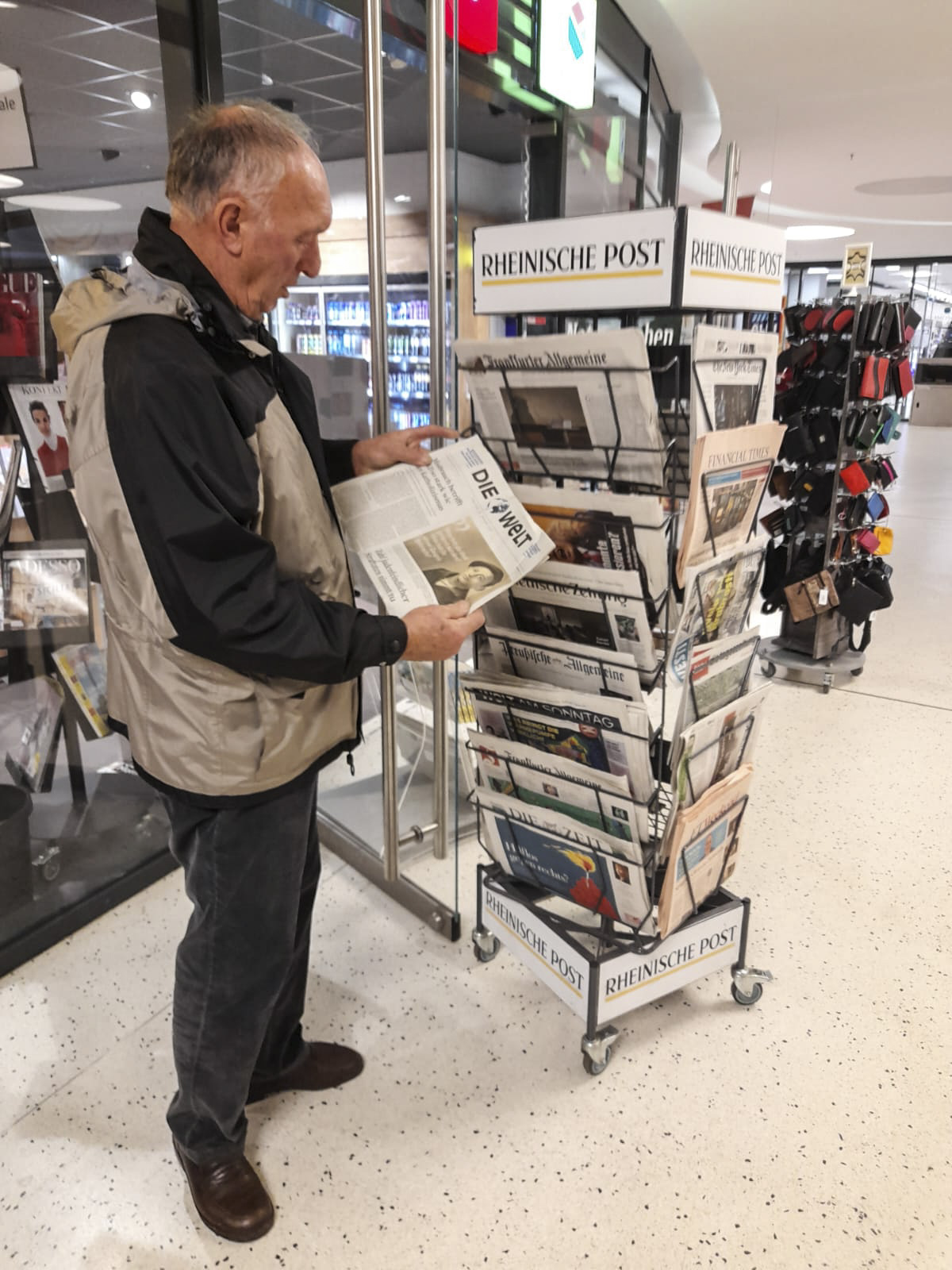
“They have the habit of reading,” said my father, about the Germans.
I can notice this on the buses. Sitting in front of me is a gray-haired man who spends about ten minutes glancing at the headlines before taking out a notebook and pen from his pocket, and notes down the discounted items advertised in the newspaper. We traveled by tram to the suburbs to see an Albanian shop. It reminded me of my uncles’ shop in Talinoc i Jerlive, with the arrangement of products on the shelves, except it didn’t have the same long cashier stand. The shop is near the Düsseldorf-Rath S-Bahn station and is very popular with Albanians.
“Here you can find everything here that you would in Kosovo,” said Selvija. “Look at the wooden cradle.”
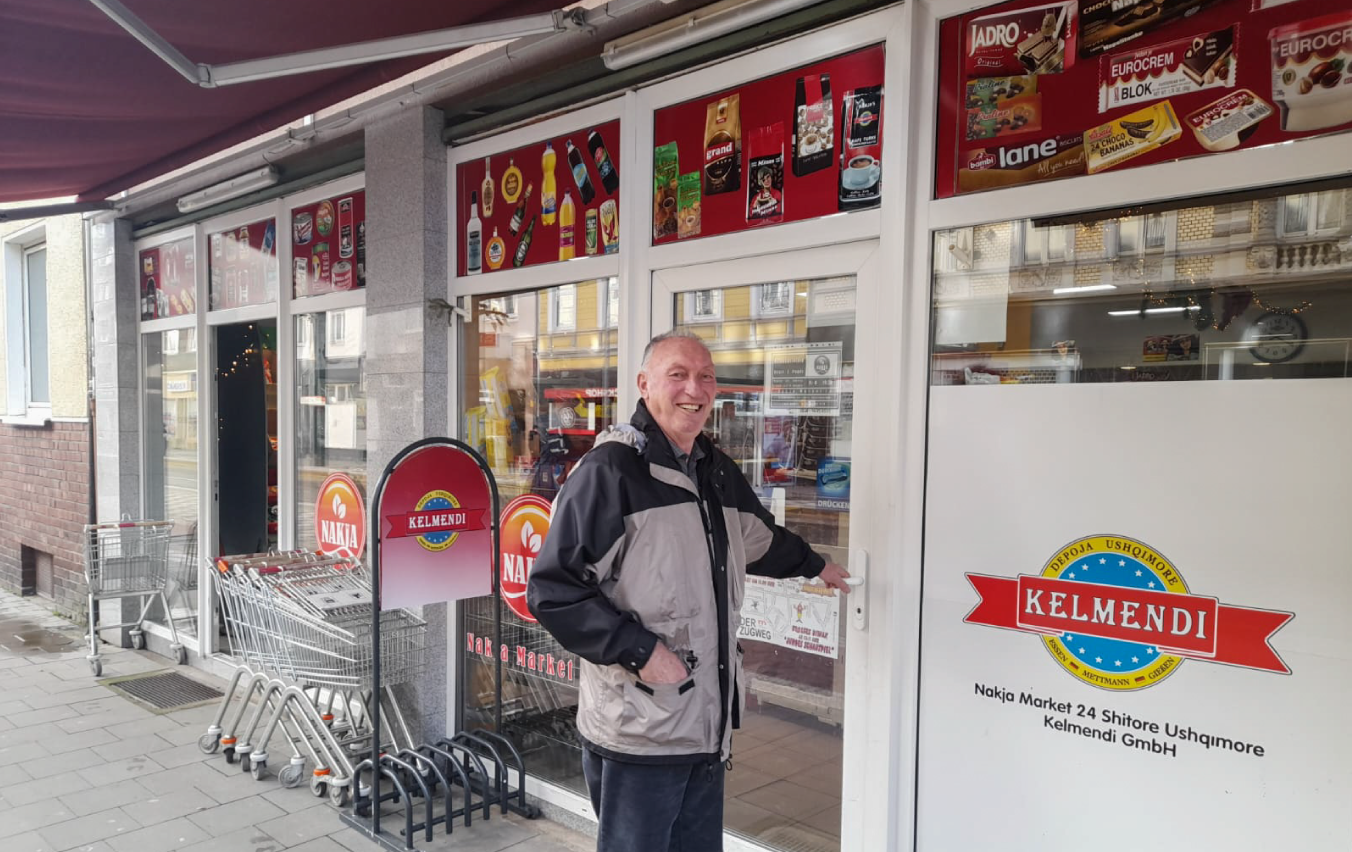
In the cafe on Herr Straße where Albanians gather on Saturdays, there are many stories similar to my father’s, detailing the challenges of the illegal routes taken to reach Germany.
Laughter begins whenever Bashkim, an Albanian waiter, brings a new customer their order. “He cannot even remember the order for two people, they say, ‘No worries, I’ll drink it anyway,’ and in the end he adds it to the check,” said one of my brother’s friends who joined us. “No, it’s not like that,” Bashkim replied with an accent that is typical of Albanians from North Macedonia.
On Sunday at noon, we return to the airport.
Unlike during the landing in Düsseldorf, this time the passengers applaud after the plane took off. “This time they fulfilled your wish,” I said laughing. Applauding after the plane takes off is a hard habit to understand. My relatives, including my father, sisters and brother, have told me about this custom often. It was more common in the 1990s. Perhaps, beyond flying by plane being a new means of travel, there is also an element of gratitude that “thank God the plane took off and landed without problems.” These are two critical moments that warrant applause.
My father nods off on the flight back home, just as he did on our journey there. I return to Ferri’s “The Cuckoo Clock.” I try to weigh the advantages and disadvantages between the two countries. On page 56, I read “Condolences to the homeland,” where Ferri, one of my favorite authors, suggests that we Albanians “are our own enemies.”
The applause during landing distracts me. We touched down at Adem Jashari airport. In the terminal, one of the suitcases rolls past us which we don’t initially recognize. Our sisters and sisters-in-law had filled it with gifts for us and our family members.
“There’s nowhere better than Kosovo, if only they were to raise the salaries a little bit,” said my father in the following days. In the meantime, I returned to reading the half-finished book by Ferri. “Condolences to the homeland” ends with “That which I erase I have inside my head, before I believe it, I tell it to someone else”
Feature Image: Rexhep Maloku / K2.0.
The content of this article is the sole responsibility of K2.0.
Curious about how our journalism is funded? Learn more here.
Rexhep Maloku is a journalist on the local television channel Tema. From 2007 to June 2023, he worked as a journalist, translator and editor of international news and creator of the television show Cosmo at KOHA. He completed his bachelor’s studies in journalism and English. Currently, he is studying for a master’s degree in journalism, public administration and diplomacy.
